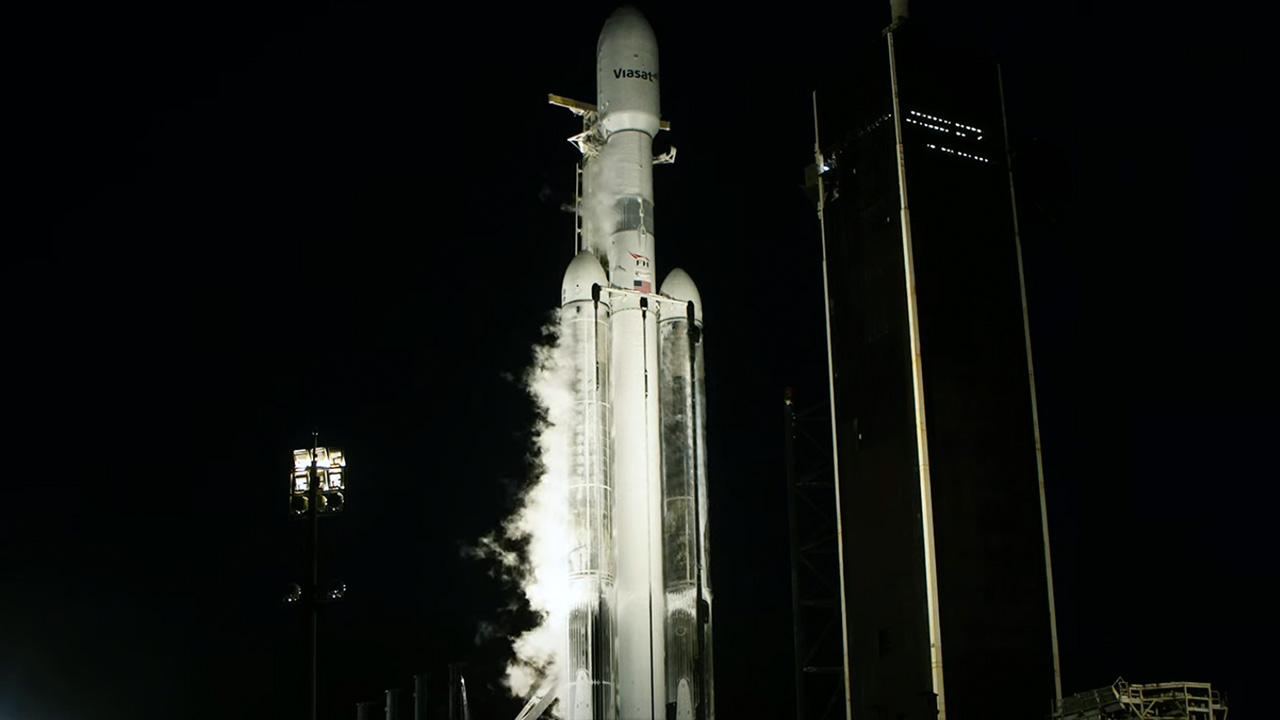SpaceX Falcon Heavy rocket aborts triple satellite launch at last minute
"There are thousands of ways to launch a rocket and there's only one way that it can go right," SpaceX says.
A SpaceX Falcon Heavy rocket carrying three satellites aborted an attempted launch at the last minute late Friday (April 28).
The heavy-lift Falcon Heavy rocket was 59 seconds from lifting off at 8:26 p.m. EDT (0026 GMT) from Pad 39A of NASA's Kennedy Space Center in Florida when SpaceX called an abort. The rocket was about to enter its startup phase, but did not ignite its 27 first-stage engines, nine each on its three core boosters. It's unclear what caused the abort.
"We did call an abort at T-59 seconds. The vehicle and payload remain healthy," SpaceX propulsion engineer Atticus Vadera said after the abort. "Keep in mind, the purpose of the countdown is to help us catch potential issues prior to flight. There are thousands of ways to launch a rocket and there's only one way that it can go right."
Related: When SpaceX's 1st Falcon Heavy launched Elon Musk's Tesla into space

SpaceX is now targeting Sunday, April 30, for its next Falcon Heavy launch attempt during a 57-minute window that opens at 7:29 p.m. EDT (2329 GMT). You can watch the liftoff live at Space.com, courtesy of SpaceX, or directly via the company.
"Latest weather forecast shows an 80% chance of favorable conditions during Falcon Heavy's launch window on Sunday," SpaceX wrote in a Twitter update Saturday (April 29).
The upcoming Falcon Heavy launch will mark SpaceX's sixth flight of the heavy-lift booster, which made its debut in 2018. For this mission, the rocket's primary payload is ViaSat-3 Americas, a 14,000-pound (6,400 kilograms) satellite designed to offer broadband services for the California-based company Viasat.
Get the Space.com Newsletter
Breaking space news, the latest updates on rocket launches, skywatching events and more!
The rocket is also carrying two smaller satellites: Arcturus, the first satellite built by the company Astranis, which is a small communications satellites; and the tiny communications cubesat GS-1 built by Gravity Space of Washington.
While Falcon Heavy rockets are designed to have reusable first stages that land, like their smaller Falcon 9 counterparts, SpaceX does not plan to reuse the core boosters from this mission in order to use the propellant normally reserved for landing to deliver its massive payload into orbit.
Tariq Malik is the Editor-in-Chief of Space.com. Follow him on Twitter @tariqjmalik. Follow us on Twitter @Spacedotcom or Facebook.
Join our Space Forums to keep talking space on the latest missions, night sky and more! And if you have a news tip, correction or comment, let us know at: community@space.com.

Tariq is the Editor-in-Chief of Space.com and joined the team in 2001, first as an intern and staff writer, and later as an editor. He covers human spaceflight, exploration and space science, as well as skywatching and entertainment. He became Space.com's Managing Editor in 2009 and Editor-in-Chief in 2019. Before joining Space.com, Tariq was a staff reporter for The Los Angeles Times covering education and city beats in La Habra, Fullerton and Huntington Beach. In October 2022, Tariq received the Harry Kolcum Award for excellence in space reporting from the National Space Club Florida Committee. He is also an Eagle Scout (yes, he has the Space Exploration merit badge) and went to Space Camp four times as a kid and a fifth time as an adult. He has journalism degrees from the University of Southern California and New York University. You can find Tariq at Space.com and as the co-host to the This Week In Space podcast with space historian Rod Pyle on the TWiT network. To see his latest project, you can follow Tariq on Twitter @tariqjmalik.









